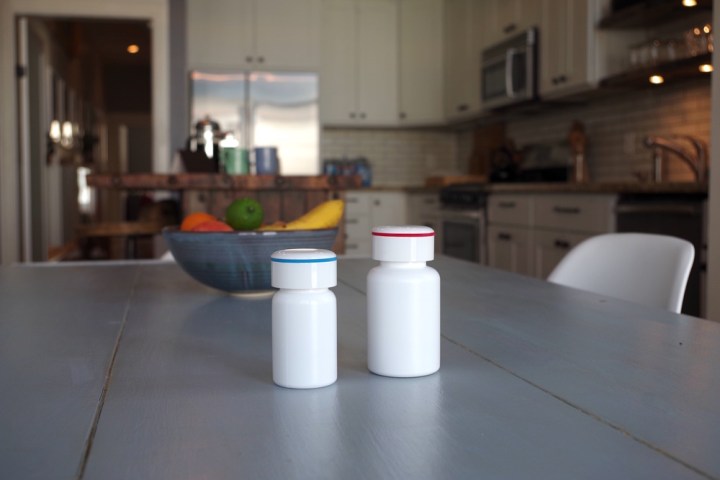
It’s a problem that Pillsy, a smart pill bottle that keeps track of daily doses, aims to solve.
Company co-founder Jeff LeBrun conceived of the idea when he and his wife struggled to follow a pill-taking routine.
“I tried reminders on my phone, but they would often go off when I was nowhere near my pills,” he said. “And [though] my wife is a very capable person who is good at almost everything she does, [even] she found that it was difficult to remember to take these new vitamins on a regular basis.”
Pillsy isn’t very complicated, and that’s the point — the team set out to build “[something] accessible to as many people as possible.” Every Pillsy packs a Bluetooth 4.0 radio, an open/closed sensor (the second-generation model has a load sensor), and a battery than lasts for more than 12 months on a charge.

A smartphone app does most of the heavy lifting. Pillsy automatically senses when the pill bottle is opened and closed, and sends an alert via SMS, lock screen notification, and/or phone call when you forget a dose. It monitors for double doses, and keeps track of how many pills are remaining.
A family sharing feature lets you choose you monitor a loved one’s doses and get weekly reports. And if you use Pillsy to keep track of vitamins, the app syncs a nutrient report to Apple Health, Apple’s wellness platform on iOS.
Trouble keeping track of medication is the leading cause of placement in nursing homes, LeBrun said. But the problem cuts across generational lines — young people are statistically worse at taking their pills than the elderly, LeBrun said.
“It’s really not that surprising,” said LeBrun. “Today, most people are simply handed new pills and told to take them once or twice a day, but with none of the tools needed to build a new habit. There are no visual cues, no rewards, and no regular support. A short discussion with a doctor or a pharmacist is simply not enough.”
LeBrun’s solution is the “habit loop,” a concept in behavioral psychology that posits developing a new habit requires (1) a cue, (2) the desired action, and (3) a reward.

To that end, the Pillsy app ships with a motivational chat bot that provides helpful advice. If a user skips doses, Pillsy’s bot asks them why, so they can drill down to the core reasons and get back on track.
“Most pills that have longer-term benefits don’t come with a trigger or a reward,” LeBrun said. That’s bad news for prescriptions. “Research has shown that most people forget the prescription instructions that are given to them verbally only 10 minutes after leaving the doctor’s office.”
The team has already had success. They’ve recruited dozens of beta testers who are using it to help with prenatal vitamins, antidepressants, ADHD medications, and drugs to treat cancer and HIV. And LeBrun’s wife — one of Pillsy’s first beta testers — went from taking vitamins 40 percent of the time to taking them over 98 percent of the time.
“I wanted Pillsy to be friendly, fun, and easy-to-use,” said LeBrun. “Pillsy is intentionally simple to use, but we believe it can help many people take control over an important part of their help. We’re starting with a smart pill cap, but our ambitions are actually much greater.”
Pillsy is available for prepurchase starting today.


